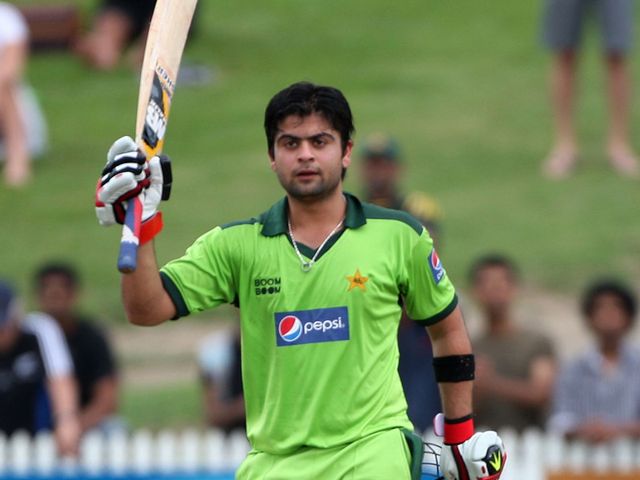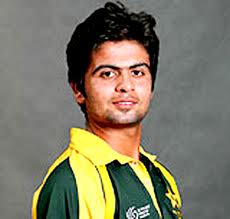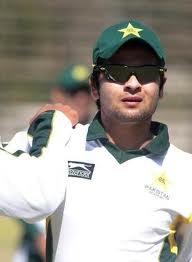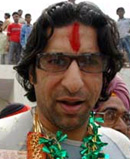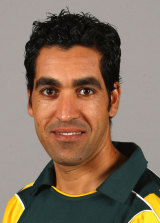Imran Farhat Biography
source (google.com.pk)
Imran Farhat (born 20 May 1982 in Lahore) is a Pakistani cricketer who
has played 20 Tests and 26 One Day Internationals for Pakistan, opening
the batting in 47 of his 49 international innings. When in form, Farhat
is an excellent player of the pull shot. However, he has the tendency
to fall for one too many. A fine player of the drives either side of
the wicket Farhat made his senior debut aged 15 in a one-day match for
Lahore City against Malaysia, together with three other players who
went on to play Test cricket (Taufeeq Umar, Bazid Khan and Kamran
Akmal). Three years later, in February 2001, Farhat made his One Day
International debut, against New Zealand in Auckland, scoring five runs
in a chase of 150 to win. After the tour of New Zealand, where Farhat
played three Tests and three ODIs, he was sent back to domestic cricket
before returning against Australia in the third Test of the 2002–03
series, where he made 29 and 18 in an innings defeat. However, he was
retained for the home two-Test series against South Africa in 2003–04,
where he scored 235 runs including a maiden Test century in a 1–0 series
win, second behind fellow opener Taufeeq Umar. A month later, Farhat
played in an ODI-only series against New Zealand, which Pakistan won
5–0, and Farhat made three fifties along with his second international
century, ending with 348 runs at a batting average of 69.60, once again
the second-highest amount of runs — this time behind Yasir Hameed. The
season was rounded off with another century, this time against India,
where he made 101 to help Pakistan gain a 202-run first-innings lead and
eventually won the match by nine wickets. However, Farhat tallied 81
runs in the other two matches, which Pakistan lost to lose the series
1–2. Farhat was less impressive the following season, however, and in
four Tests, two against Sri Lanka and two against Australia, he only
passed fifty twice, ending the season with 199 runs at 24.87 before the
selectors left him out for the third Test of the series with Australia.
In September 2004, just before the 2004–2005 season, he had been
dropped from the ODI side following the 2004 Champions Trophy, as he
had failed to pass 40 with any of his last ten innings, and that
included 38 not out against the non-Test nation of Kenya, 20 against
ODI debutants Hong Kong and 24 against bottom-ranked Bangladesh. He
continued to score heavily in the domestic competitions and a century
in a practise game against the visiting Indian team was rewarded with a
place in the squad to take on India in the Test series (2006). He
returned to Test cricket in style, with an important half century in
the deciding third Test at Karachi. His brother Humayun Farhat has also
played International cricket for pakistan
Full Name: Imran Farhat
Date of Birth: May 20, 1982, Lahore, Punjab
Major
Team: Pakistan, Biman Bangladesh, Habib Bank Limited, ICL Pakistan XI,
Lahore, Lahore Badshahs, Lahore Eagles, Lahore Lions, Pakistan
Reserves
Playing Roll: Batsman
Batting Style: Left
Bowling Style: Legbreak
Nick Name: Romi
Current age 29 years 14 days
Major
teams Pakistan, Biman Bangladesh, Habib Bank Limited, ICL Pakistan XI,
Lahore, Lahore Badshahs, Lahore Eagles, Lahore Lions, Pakistan
Reserves
Also known as Romi
Batting style Left-hand bat
Bowling style Legbreak
Relation Father-in-law - Mohammad Ilyas, Brother - Humayun Farhat
A
gifted young left-handed opener who threatened at one stage to solve
Pakistan's perennial opening conundrum, Imran Farhat had a brief spell
in the Pakistan side after success with the national under-19 and A
sides. Farhat also evokes Saeed Anwar but only fleetingly; he bludgeons
rather than times his runs. He was rather too cavalier in his early
appearances in the Test arena, and was promptly discarded after the tour
to New Zealand in 2000-01. However, he tightened his game and achieved
much more success in the 2003-04 season. Tempering his impressive
array of shots with better defensive technique, Farhat scored a deluge
of runs in the home series against South Africa and New Zealand, being
involved in a record four successive hundred partnerships with Yasir
Hameed in the one-day internationals against New Zealand. He also
notched up his first century in both Tests and ODIs during this season,
and then went on to score a vital 101 in Pakistan's victory against
India in the Lahore Test. But since the India series, he has fallen
away. A mediocre series at home to Sri Lanka and away to Australia saw
him falter, especially with the emergence of the other left-handed
opener, Salman Butt. When Pakistan included only one specialist opener
in the squad for the series against England in 2005 - Butt - seemingly
it confirmed that Farhat, temporarily, was out of national reckoning.
But as an opener in Pakistan, you are never out of national reckoning
and sure enough Farhat was back for the final Test against India, where
he scored a fifty. That performance saw him on the plane to Sri Lanka
and an average series. But with openers becoming as rare as dinosuars
in Pakistan, he was retained for the summer tour to England, where he
again produced some mixed results. Despite failures in the first two
Tests, a broken finger and a spate of dropped catches, he came back to
score a cavalier 91 in the final, fateful Oval Test. Runs against West
Indies at home were followed by a barren patch in South Africa. A first
away hundred followed by a patient half-century in the Napier Test of
2009 has set him up for a long sojourn in the Test side. His ODI career
has however hit roadblocks since he was dropped after an indifferent
run of scores in 2006.
Categories: CRICKETERS BIOGRAPHY, PAKISTAN CRICKETERS BIOGRAPHY
A
gifted young left-handed opener who threatened at one stage to solve
Pakistan's perennial opening conundrum, Imran Farhat had a brief spell
in the Pakistan side after success with the national under-19 and A
sides. Farhat also evokes Saeed Anwar but only fleetingly; he bludgeons
rather than times his runs. He was rather too cavalier in his early
appearances in the Test arena, and was promptly discarded after the tour
to New Zealand in 2000-01. However, he tightened his game and achieved
much more success in the 2003-04 season. Tempering his impressive
array of shots with better defensive technique, Farhat scored a deluge
of runs in the home series against South Africa and New Zealand, being
involved in a record four successive hundred partnerships with Yasir
Hameed in the one-day internationals against New Zealand. He also
notched up his first century in both Tests and ODIs during this season,
and then went on to score a vital 101 in Pakistan's victory against
India in the Lahore Test. But since the India series, he has fallen
away. A mediocre series at home to Sri Lanka and away to Australia saw
him falter, especially with the emergence of the other left-handed
opener, Salman Butt. When Pakistan included only one specialist opener
in the squad for the series against England in 2005 - Butt - seemingly
it confirmed that Farhat, temporarily, was out of national reckoning.
But as an opener in Pakistan, you are never out of national reckoning
and sure enough Farhat was back for the final Test against India, where
he scored a fifty. That performance saw him on the plane to Sri Lanka
and an average series. But with openers becoming as rare as dinosuars
in Pakistan, he was retained for the summer tour to England, where he
again produced some mixed results. Despite failures in the first two
Tests, a broken finger and a spate of dropped catches, he came back to
score a cavalier 91 in the final, fateful Oval Test. Runs against West
Indies at home were followed by a barren patch in South Africa. A first
away hundred followed by a patient half-century in the Napier Test of
2009 has set him up for a long sojourn in the Test side. His ODI career
has however hit roadblocks since he was dropped after an indifferent
run of scores in 2006.
Osman Samiuddin
One
Day Internationals for Pakistan, opening the batting in most of his
international innings. Farhat made his senior debut aged 15 in a one-day
match for Lahore City against Malaysia, together with three other
players who went on to play Test cricket (Taufeeq Umar, Bazid Khan and
Kamran Akmal). Three years later, in February 2001, Farhat made his One
Day International debut, against New Zealand in Auckland, scoring 20
runs in a chase of 150 to win. After the tour of New Zealand, where
Farhat played three Tests and three ODIs, he was sent back to domestic
cricket before returning against Australia in the third Test of the
2002–03 series, where he made 30 and 22 in an innings defeat. However,
he was retained for the home two-Test series against South Africa in
2003–04, where he scored 235 runs including a maiden Test century in a
1–0 series win, second behind fellow...
International Debut: 2001
Batting and fielding records
M Inns NO Runs HS Ave BF SR 100 50 4s 6s Ct St
Test 39 75 2 2327 128 31.88 4819 48.29 3 14 340 4 40 -
ODI 37 37 1 1114 107 30.94 1591 70.02 1 7 120 14 13 -
T20I 5 5 0 41 14 8.20 45 91.11 - - 7 - 4 -
Bowling records
M Inns Balls Runs Wkts BBI BBM Ave Eco SR 4W 5W 10W
Test 39 15 427 284 3 2/69 2/69 94.67 3.99 142.33 - - -
ODI 37 8 116 110 6 3/10 3/10 18.33 5.69 19.33 - - -
T20I 5 - - - - - - - - - - - -
Career Statistics
Test Debut: New Zealand v Pakistan at Auckland, 08-12, Mar 2001
ODI Debut: New Zealand v Pakistan at Auckland, Feb 17, 2001
Twenty20 Debut: Australia v Pakistan at Melbourne, Feb 05, 2010
Batting and fielding averages
Mat Inns NO Runs HS Ave BF SR 100 50 4s 6s Ct St
Tests 39 75 2 2327 128 31.87 4819 48.28 3 14 340 4 40 0
ODIs 37 37 1 1114 107 30.94 1591 70.01 1 7 120 14 13 0
T20Is 5 5 0 41 14 8.20 45 91.11 0 0 7 0 3 0
First-class 144 249 13 9643 242 40.86 23 41 134 0
List A 141 139 10 4670 164 36.20 11 22 63 0
Twenty20 22 22 1 596 115 28.38 404 147.52 1 3 78 20 11 0
Bowling averages
Mat Inns Balls Runs Wkts BBI BBM Ave Econ SR 4w 5w 10
Tests 39 15 427 284 3 2/69 2/69 94.66 3.99 142.3 0 0 0
ODIs 37 8 116 110 6 3/10 3/10 18.33 5.68 19.3 0 0 0
T20Is 5 - - - - - - - - - - - -
First-class 144 5380 3062 103 7/31 29.72 3.41 52.2 2 0
List A 141 2765 2398 83 4/13 4/13 28.89 5.20 33.3 3 0 0
Twenty20 22 14 292 382 24 5/26 5/26 15.91 7.84 12.1 0 1 0
Recent matches
Bat & Bowl Team Opposition Ground Match Date Scorecard
5, 3/56, 15 Punjab (Pak) v Khyber-Pak Lahore 9 Mar 2011 First-class
4, 128 Punjab (Pak) v Baluchistan Lahore 3 Mar 2011 First-class
65, 0/1 Punjab (Pak) v Federal Lahore 25 Feb 2011 First-class
75, 2/77 Punjab (Pak) v Sind Lahore 19 Feb 2011 First-class
0 Habib Bank v National Bnk Lahore 8 Feb 2011 List A
0/10, 89 Habib Bank v WAPDA Lahore 6 Feb 2011 List A
1/17, 12* Habib Bank v PIA Rawalpindi 3 Feb 2011 List A
164, 1/28 Habib Bank v Leopards Islamabad 1 Feb 2011 List A
1, 1/8 Habib Bank v K Dolphins Rawalpindi 30 Jan 2011 List A
150 Habib Bank v Sui Gas Islamabad 28 Jan 2011 List A
Latest Articles
Raja, Cheema, Sohail included in squad for Zimbabwe (Jul 28, 2011)
Kaneria spins out Khyber-Pakhtunkhwa (Mar 5, 2011)
Khalil, Farhat put Punjab on top (Mar 4, 2011)
HBL and NBP set up final clash (Feb 6, 2011)
All-round Sabir hands PIA fourth win (Feb 1, 2011
Imran Farhat
Imran Farhat
Imran Farhat
Imran Farhat
Imran Farhat
Imran Farhat
Imran Farhat
Imran Farhat
Imran Farhat
Imran Farhat
Imran Farhat


